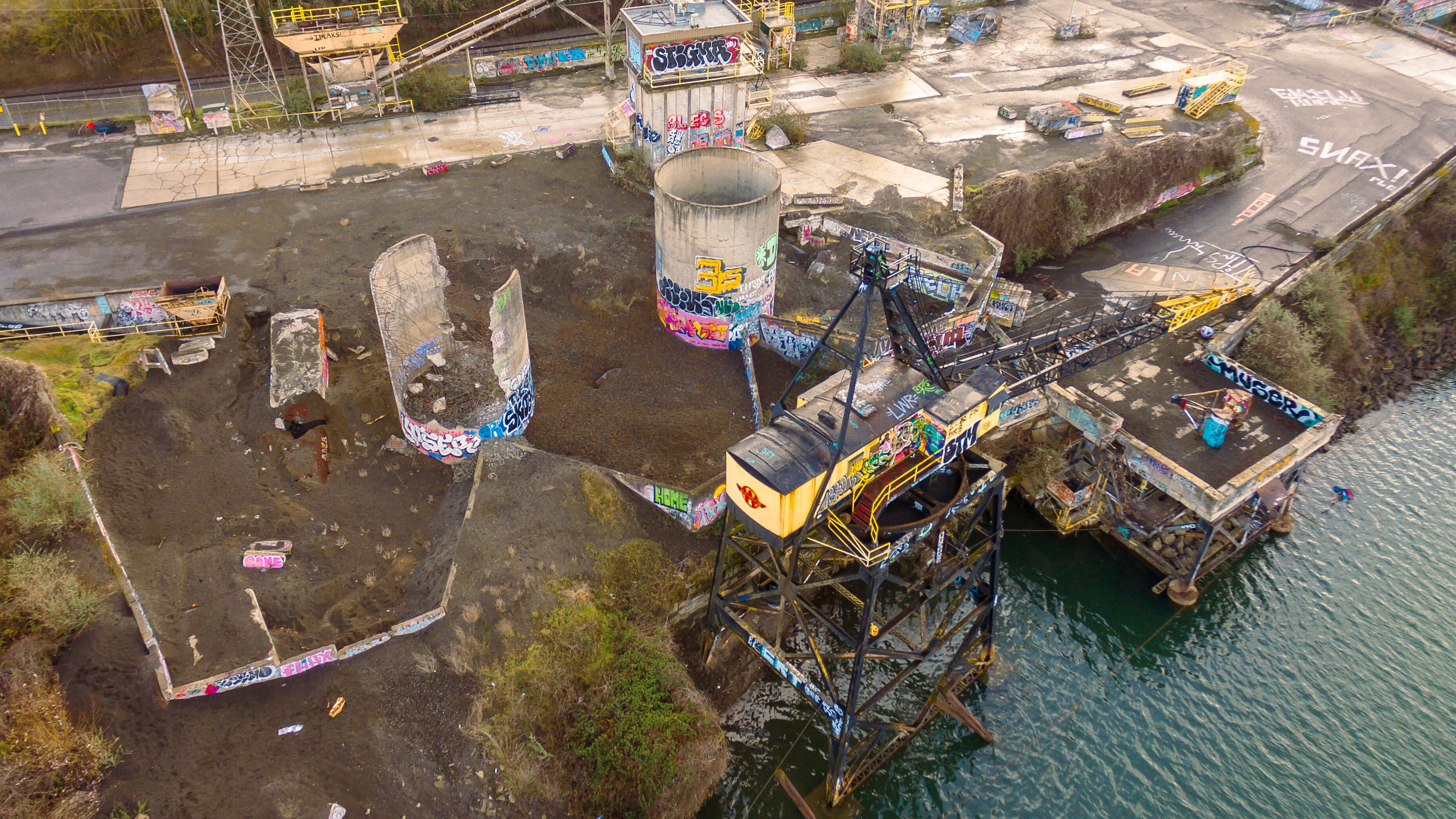Matters appear to have gotten significantly worse inside the pension plan long overseen by one of Oregon’s most storied business leaders.
According to recently submitted but still incomplete filings with the U.S. Department of Labor, the R.B. Pamplin Corporation and Subsidiaries Pension Plan and Trust held 52% of its assets in real estate at the end of 2022—up from 36% at the end of 2021.
That’s more than five times the maximum the Labor Department allows. The agency also requires that any real estate a pension fund owns be bought in an arm’s-length transaction, and have multiple uses. None of that is true for the real estate now held for the benefits of retirees from Pamplin’s various companies.
WW first reported on Pamplin’s unusual real estate transactions last year (“Trader Bob,” Feb. 23, 2022) and later explored the ramifications of several additional sales, including Ross Island, to the pension fund.
Pension experts say it is inappropriate for a pension fund to hold so much real estate, and to have that real estate come from R.B. Pamplin Corp. operating companies.
In 26 separate transactions in 2022, however, Pamplin companies sold real estate to the pension plan, which by law makes investments solely for the benefit of 2,117 current and future retirees.
Both R.B. Pamplin Corp. and its pension fund have long been run by the same man: Robert B. Pamplin Jr.
The federal Department of Labor, which oversees pension funds, generally prohibits companies from selling or contributing real estate to affiliated pension plans, DOL spokesman Michael Petersen, previously told WW. When asked about the legality of Pamplin’s latest pension activities, Petersen said he could not comment. Pamplin officials did not respond to questions.
The feds frown on companies selling property to related pension funds because such transactions can create a conflict of interest between buyer and seller, and may saddle the pension fund (and retirees who depend on income from that fund) with risky, illiquid assets. The un- or underused industrial real estate that now makes up the majority of Pamplin pension assets seems to fit that description.
In addition, many companies’ pension funds are overseen by independent managers whose job is to look out for the best interests of beneficiaries. But Pamplin is chairman and CEO of R.B. Pamplin Corp. as well as the sole trustee of its pension fund.
Since 2018, records show, Pamplin’s companies have systematically sold real estate to the pension fund for his retirees, raising more than $60 million for his operating companies through more than 70 separate transactions. (Prior to 2018, records show, the pension fund didn’t hold any real estate.)
Pension experts WW has consulted find the sales extraordinary.
“I can’t think of a single employee benefits or tax lawyer or accountant that could persuasively argue that these transactions are customary or legally appropriate. They are not,” says James Ambrose, a longtime Portland pension lawyer. “They are highly, highly unusual and unquestionably direct violations of the statutes, regulations and case law that govern pensions.…To say that the plan sponsor [Pamplin] is on thin ice would be a massive understatement. They are attempting to walk on water.”
For decades, Robert B. Pamplin Jr., 82, operated in the shadow of his father, the late Robert B. Pamplin Sr. The elder Pamplin grew then-Portland-based Georgia Pacific into one of the nation’s largest timber companies and also built one of the largest privately held textile manufacturers in the United States. He also ran Ross Island Sand & Gravel.

Pamplin Sr. had one child, Robert Jr., who took over the business and diversified into Christian music publishing and a string of radio stations (subsequently sold), a winery, and even 24 newspapers (the Pamplin Media Group).
But as WW has previously reported, R.B. Pamplin Corp.’s businesses are sputtering. Based on an examination of lawsuits seeking payment, unpaid taxes, liens and other indications, the fortune that once placed Pamplin Jr. on the Forbes list of the 400 wealthiest Americans appears greatly diminished.
Some recent examples:
- On Aug. 17, Pacific Fence and Wire filed a contractor’s lien for $153,000 for work completed in June. The company erected a fence around the headquarters of one of R.B. Pamplin Corp.’s most visible assets, Ross Island Sand & Gravel at 4315 SE McLoughlin Blvd., but didn’t get paid. (Pacific Fence did not respond to a request for comment.)
- On Sept. 15, R.B. Pamplin Corp. sold the company’s Milwaukie headquarters to Clackamas County for $11 million. The sale allowed it to pay off a $184,000 property tax bill—but not some other creditors.
- On that same day, an attorney for the International Union of Operating Engineers Local 701 recorded a judgment against Ross Island Sand & Gravel for $368,000.
James Anderson, the business manager for IUOE Local 701, whose members work on Ross Island and at Ross Island Sand & Gravel’s California dredging operations, has sued Ross Island repeatedly for failure to pay workers their contractual benefits.
In order to get the money his members are owed, Anderson says, he’s resorted to garnishing the rent the city of Portland pays to Ross Island Sand & Gravel to use of the company’s McLoughlin Boulevard headquarters. (Portland Parks & Recreation uses the property for a maintenance yard.)
“We’ve been getting checks every month from that,” Anderson says, “but they still owe us money.”
Ross Island still owes Multnomah County money as well: Records show unpaid property taxes on the company headquarters currently stand at $118,000.
The struggles at R.B. Pamplin Corp. may have led Pamplin to the strategy of selling unwanted real estate to the pension fund. Doing so provided a steady stream of cash at a time the American textile industry struggled and Pamplin’s local businesses did as well.
Pamplin’s pension filings for 2022 remain incomplete and do not yet include full details of more than two dozen additional sales of property to the pension fund last year. An examination of some of the deeds from those sales shows an odd pattern: the sale of partial interests in larger properties.
On May 10, 2022, for instance, R.B. Pamplin Corp. sold a 15% interest in a parcel of land to the pension fund for $241,500. It earlier sold the derelict Ross Island itself to the pension fund in four separate parcels for $10.8 million.
That sale stunned knowledgeable sources.
“The pension fund will be in a tough situation if they seek to sell the property for anywhere near $10.8 million, so any profit is highly unlikely, which of course is the point of such an investment,” says Travis Williams of Willamette Riverkeeper. “If an appraisal exists for the property, I’d love to see it.”
Throughout 2022, Pamplin Corp. and its subsidiaries made similar partial sales, leaving the pension fund with a portfolio stuffed with illiquid assets. The risk: The pension fund could no more sell such partial properties than it could sell half a dog.
Ambrose says the unusual, partial sales give the appearance R.B. Pamplin Corp is using the fund as a bank.
“Siphoning off cash from the plan for the benefit of plan sponsor appears to be taking place,” Ambrose says.
Pamplin officials have previously explained that the operating companies lease properties back from the pension fund. The new filings support that claim, but Ambrose says that’s also a risky strategy: The operating companies are financially shaky and therefore poor credit risks. (The pension fund distributes about $9 million in retirement benefits annually.)
Real estate isn’t the only asset R.B. Pamplin Corp. is selling.
Newspaper industry sources say the Pamplin Media Group is also shopping its two dozen publications, most of which are clustered in the tri-county area. Cribb, Greene & Potts, a Montana brokerage firm reportedly involved in the potential sale, did not respond to a request for comment.

